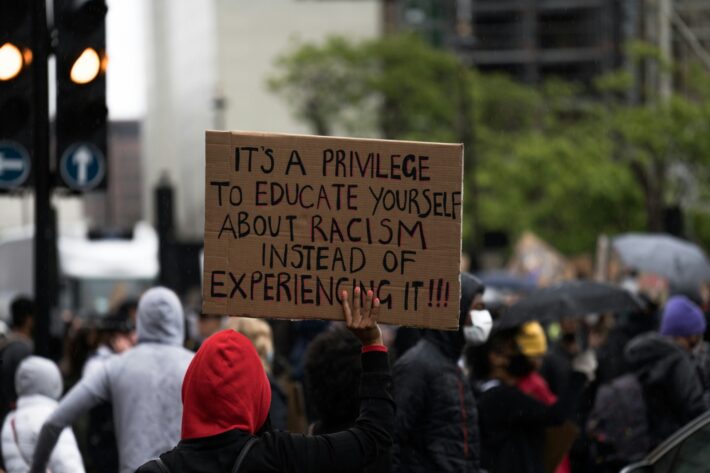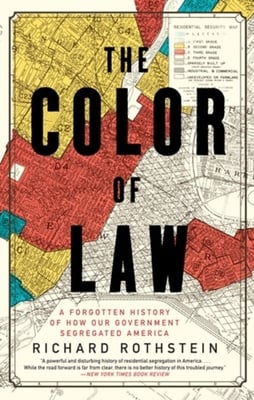
As a theist Unitarian Universalist, I believe in our 1st Principle: the inherent worth and dignity of every person. Because I believe that every person holds a spark of the divine, and that all people are my neighbors, I must work to learn about the experiences of the most marginalized and disadvantaged in our culture, understand how our systems affect them, and work to make things more just and equitable for all. This is particularly important to me on the topic of financial advantages and disadvantages. Many of the systems and laws in the U.S. were built to support smoother economic passages for people like me: an older, well-educated, cis-gendered, white male.
On the national level, the presidential election is heating up. As it does, statements across the political spectrum get more inflammatory, and the topic of racism in America becomes more fraught with disagreement. We all want to believe that we are a nation of good people, trying to fulfill the aspirations of our founders, who upheld equality, liberty, and justice for all.
However, it is undeniable that our founding culture included slavery and racism against all BIPOC people. The effects from this discrimination and violence have rippled down through the generations since. The motivation for slavery and racism was tied to profit, which built wealth and power for some and intentionally kept others economically oppressed and marginalized, even considering them as possessions and less than human. Was this discrimination systemic and created in the various levels of government? Or did it result from bias in individuals and non-governmental organizations like corporations?
In The Color of Law: A Forgotten History of How Our Government Segregated America, Richard Rothstein answers these questions. The book is a comprehensive exploration of the government’s role in creating and perpetuating racial segregation and oppression in the United States, using personal stories and showing specific changes in laws, building codes, and policies. The book leans heavily on legal issues that are not commonly known, yet the book is readable and compelling.

Published in 2017, Rothstein’s book challenges the common perception that segregation in American cities and towns is solely the result of de facto segregation — that it results from individual choices and income factors, or from private company interests by real estate agencies and banks. Instead, he argues that discrimination was, and is today, de jure segregation. This means the enforcing and upholding of racist real estate (and city planning) practices were perpetuated by government policies at the federal, state, and local levels.
Rothstein begins by examining the historical context of segregation, tracing its roots to the early 20th century and the Great Migration of African Americans from the South to urban areas in the North and West. He then delves into the various ways in which government policies systematically segregated communities, focusing on discriminatory practices in housing, zoning, and lending.
One of the key points Rothstein makes is the role of the Federal Housing Administration and its promotion of racially discriminatory practices, such as redlining. Through redlining, neighborhoods were designated as high risk or low risk based on racial composition, leading to the denial of loans and insurance to minority communities. Once a community was redlined, real estate values plummeted, so investors could buy up inexpensive properties and drive up rental prices for substandard housing. This had a profound impact on the accumulation of wealth, as minorities were effectively excluded from the benefits of homeownership and forced into economically disadvantaged neighborhoods.
The Color of Law also explores housing policies, urban renewal projects, and zoning laws at the state and local level — and how those effects pile on top of federal actions. Helpfully, Rothstein provides practical recommendations for policy changes to address the deep-rooted inequalities perpetuated by past practices. This book intends to educate readers so we can mobilize to advocate for the policies that Rothstein proposes.
How is this book important when we consider our own lives, our financial resources, and engagement with our faith? By recognizing the systemic nature of racial segregation in America and the historical forces that shaped the landscape of inequality, we can reflect on how our place on the economic spectrum may have been secured at the expense of others. And we can better understand our neighbors, who may have lost opportunities to build wealth and better themselves due to unjust and opaque actions by the governments tasked with protecting and uplifting us all. This book is compelling enough to inspire us all to self-examination, to prayer, and to action.
Mark Ewert | April 2024
Mark Ewert is on the Faith and Money Network board of directors. A philanthropy advisor and a certified nonprofit coach, Ewert has worked with dozens of faith communities, congregations and religious denominations.
Are you interested in a real-time exploration of these ideas and systemic forces? Consider joining us on our Trip of Perspective to the Deep South, where we’ll learn from leaders at Hope Credit Union and visit important sites in Mississippi, Alabama and Tennessee.